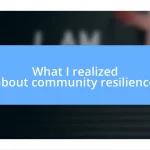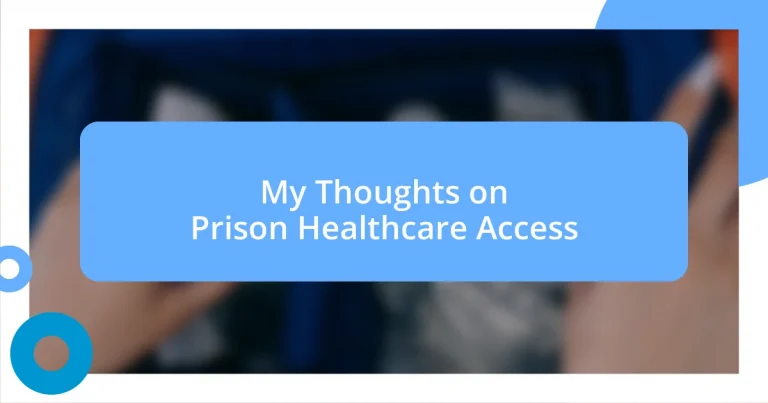Key takeaways:
- Prison healthcare systems face significant challenges, including overcrowding and underfunding, which hinder access to essential medical care and impact both inmates and society.
- Urgent reforms are needed, including increased funding, improved access, better staff training, dedicated mental health services, and the use of telemedicine to enhance care delivery.
- Personal experiences reveal the emotional and physical toll of inadequate care, highlighting the urgent necessity to address healthcare neglect within prison systems for the sake of individual and community well-being.
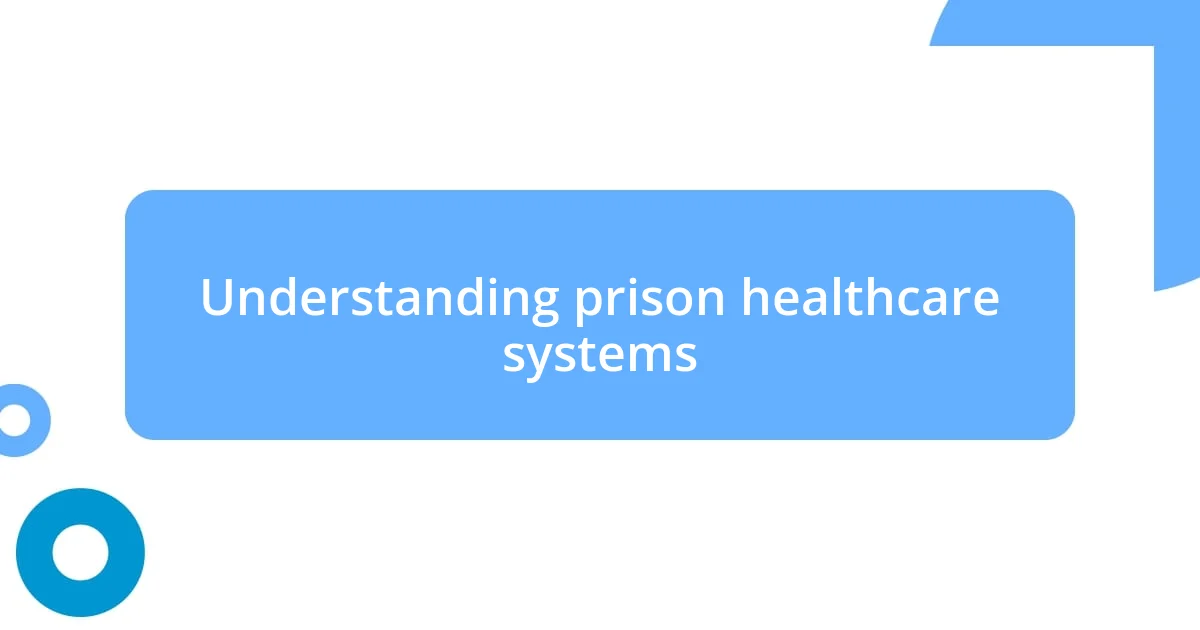
Understanding prison healthcare systems
Understanding prison healthcare systems can feel like peeling back layers of complexity. These systems often grapple with a multitude of challenges, such as overcrowding and underfunding, which can severely hinder access to essential medical care. I’ve seen firsthand how chaotic environments can stifle care—imagine waiting weeks for a simple check-up, hoping it doesn’t turn into something more serious.
It’s crucial to recognize that the healthcare provided in prisons impacts not just the individuals incarcerated, but society at large. When inmates face untreated medical issues, it can contribute to a cycle of health problems that extends beyond incarceration. I often wonder, how can we expect rehabilitation to be effective if basic health needs are neglected? The implications are vast, and they resonate with quality of life even after release.
Moreover, the diversity of healthcare needs in prisons, ranging from mental health support to chronic disease management, demands a tailored approach. From my viewpoint, having compassionate and well-trained staff is vital, as they can make a profound difference in navigating these complex medical landscapes. Have you ever considered the sheer emotional toll on individuals facing inadequate care in such a restrictive environment? It’s a profound issue that deserves our collective attention.
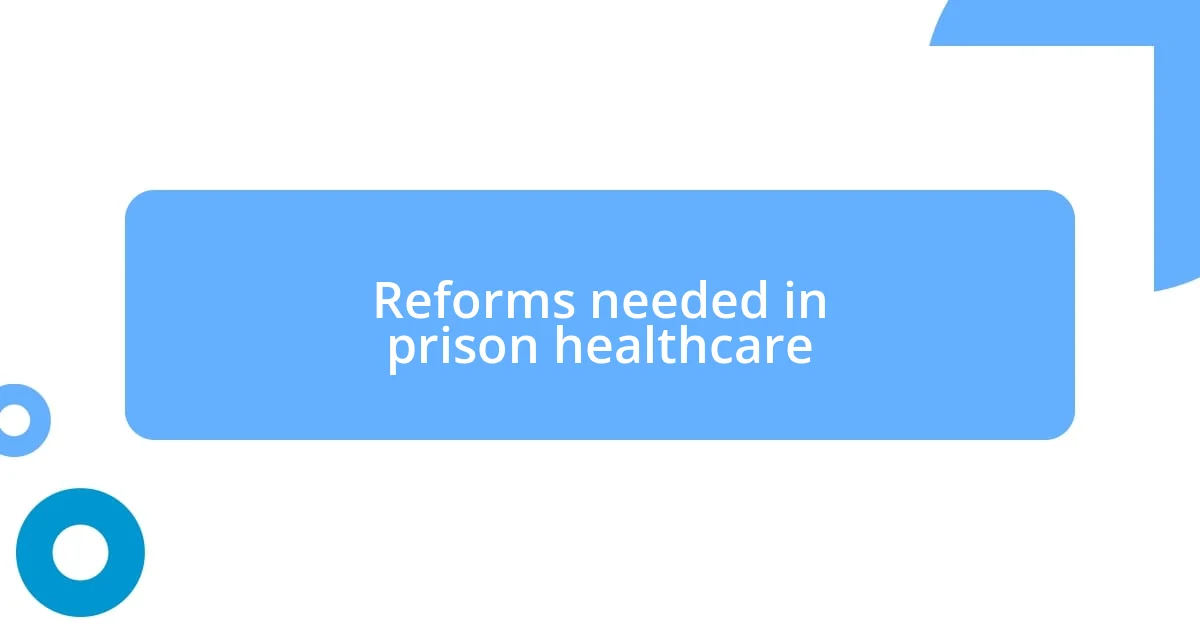
Reforms needed in prison healthcare
The need for reforms in prison healthcare is immediate and pressing. Many facilities operate with outdated systems that fail to provide necessary care, leading to serious health consequences. I remember speaking with a former inmate who described how untreated hypertension escalated dangerously because follow-up appointments were nonexistent. That’s not just a statistic; it’s someone’s life at risk due to systemic neglect.
To drive meaningful change, the following reforms should be prioritized:
– Increase Funding: Allocate more resources to healthcare budgets in correctional facilities.
– Improve Access: Implement regular health screenings and timely appointments for both physical and mental health services.
– Train Staff: Provide comprehensive training for healthcare staff on specific needs within the prison population.
– Mental Health Services: Establish dedicated programs for mental health support, acknowledging the high rates of disorders in incarcerated individuals.
– Telemedicine Opportunities: Leverage telehealth technologies to enhance access to specialists, reducing wait times and travel risks for inmates.
These changes can foster a healthier prison environment, ultimately benefiting everyone involved. The emotional burden of medical neglect is heavy, and it’s time to lift that weight with urgent reforms.
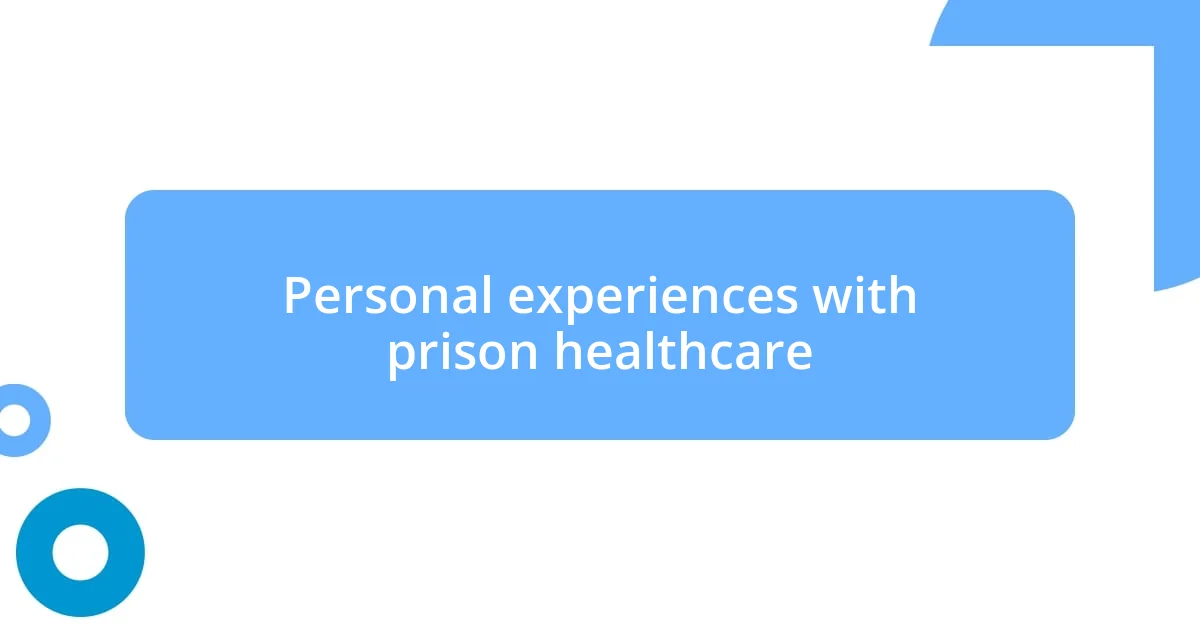
Personal experiences with prison healthcare
During my time volunteering in environments connected to prison healthcare, I witnessed moments that still resonate with me. One particular interaction stands out—a woman I spoke with relayed her experience of waiting months for dental treatment, only to be met with a temporary fix. Can you imagine the pain and frustration? It’s not just about the physical discomfort; it’s the emotional toll of feeling invisible and unheard within a system meant to provide care.
I’ve also heard heart-wrenching stories of individuals suffering from diabetes who were unable to access their necessary medication. One man described how he felt like a ticking time bomb, observing his health deteriorate while surrounded by bureaucratic obstacles. It made me question, how can the system justify such negligence? The fear they live with is palpable—the anxiety of managing chronic conditions in an environment where healthcare is an afterthought.
Some moments have prompted me to reflect deeply. During a facilitated discussion about health access, a young inmate shared how his untreated mental health issues swirled like a storm inside him, feeling helpless and trapped. His raw honesty made me realize that the burden isn’t just on the individual; it reverberates through the community. If we neglect these voices, what does that say about our humanity? The path toward reform starts with acknowledging these pervasive issues, one heartfelt story at a time.



